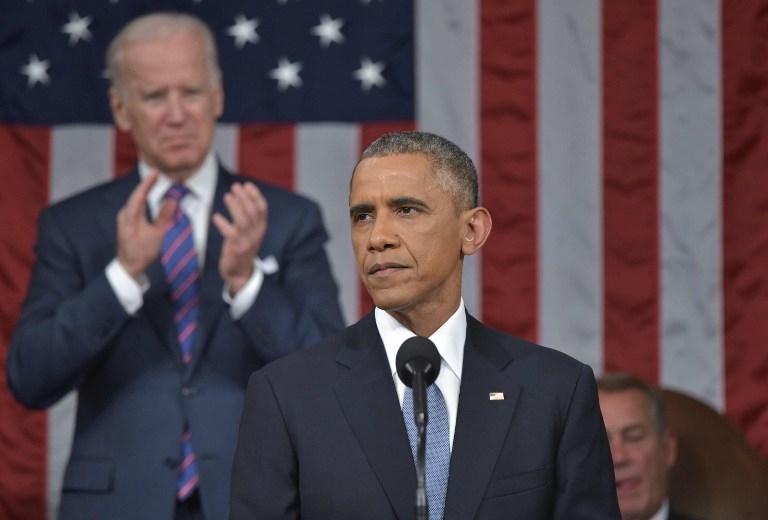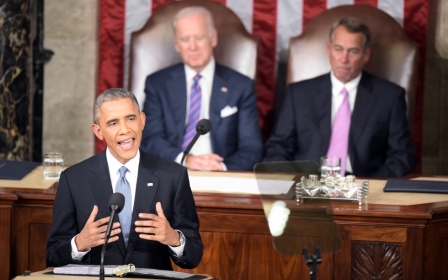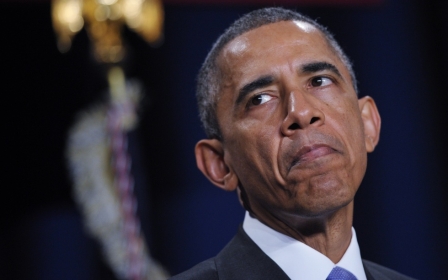Obama’s State of the Union address: the way we were

Watching Obama’s State of the Union address the other night, I had the stirring chords of America the Beautiful on the brain.
Not only because of his attractive vision of a strong, unified nation with respect for all creeds and colours emanating in all its telegenic glory from the leader of the free world, but also because I’d just watched the classic 1973 film The Way We Were.
In the film Barbara Streisand’s Katy called the group of bland, Republican friends of Robert Redford’s Hubbell, “America the Beautiful”. That not withstanding, I came away from the president’s State of the Union address with that same sense of sepia-toned nostalgia evoked in the Sydney Pollack film about love and politics in mid-century America.
Nostalgia is a dangerous yet seductive instrument, especially when applied on prime time. While Obama channelled the ghost of Martin Luther King and the dream he once had, his slick delivery felt much more like aspirationalist agitprop than actual hope and change.
A corporatist hologram of the real thing, Obama’s speech – like his presidency – rings hollow. And just like the promise of a much-loved patriotic song like America the Beautiful – it’s not so much the disappointment that wounds, but the expectation.
I admit to having been seduced at an early age by the land of Walt Whitman, jazz and Disneyland. As a Canadian, it’s a place that still draws me in, like Obama, with its charm and charisma. But the real “America” seems to have disappeared a long time ago.
Gone is the dream of a chicken in every pot, in a land where 45 million people live in poverty, of justice for all in the post-Ferguson light of day, of enlightened foreign policy free from the military industrial complex Eisenhower warned of in his parting presidential address.
America under Obama still spends 50 percent of its discretionary budget on the military; he has reignited an air war in Iraq and Syria, continues to kill innocents in Pakistan, Yemen and Somalia in drone attacks, and has yet to close Guantanamo. He expanded the war in Afghanistan and joined in the NATO coalition that overthrew Gaddafi and plunged Libya into chaotic militia violence.
His telegenic transformation into a liberal champion represents the triumph of essentialism over reality. Yes Virginia, black politicians can be just as right-wing as whites - just ask Condoleezza Rice or Colin Powell.
At a moment in American culture where a film like American Sniper that glorifies US militarism and demonises Iraqis gets an Oscar nod, while Selma – a film that reminds Americans of the brutal and ongoing road to civil rights (and is not entirely without resonances with other struggles like those of Palestinians in Israel, or say France’s Arab minority) is snubbed, the nostalgia I cling to is for the American films of the 1970s.
While the Way We Were offered more schmaltz than substance, its pivotal scene where Redford exclaims to Streisand: "We don't have free speech in this country, we never will have," resonates with not only the terrible new reality of NSA surveillance, but also the new McCarthyism imposed by the likes of AIPAC.
When a director like Ari Roth is fired from his post at the Jewish theatre in Washington DC for daring to stage a play about the Palestinian Nakba, or when University of Illinois professor Steven Salaita is fired for tweeting criticism of Israeli policy, there is something very rotten in Denmark. (Not to mention the new law Canadian Prime Minister Stephen Harper wants to pass criminalising criticism of Israel)
But Hollywood in the 70s produced a number of outspoken political films that spoke truth to power. Another Redford vehicle, Three Days of the Condor explored the dark world of the CIA; the likes of Apocalypse Now and All the President’s Men exposed the raw wound of Vietnam; even the paranoid fantasies of futuristic films such as Soylent Green ring true today in a way that is much less unbelievable than it might have been in 1973.
Somewhere along the line, perhaps with the dawn of Reaganism and rampant ‘80s materialism, politics became a dirty word and reality in was muted in favour of televisual sermons. And Republican and Democratic foreign policy became a tired game of spot the difference.
Just as The Way We Were evoked nostalgia for the days of Democratic four-times president Franklin D Roosevelt, whose New Deal promised and actually delivered hope and change, so did Obama’s State of the Union address evoke nostalgia for a fictitious “liberal” America.
But sadly Obama is no FDR. His style over substance bears more in common with Hubbell’s first novel, A Country Made of Ice Cream, while his feel-goodism masks a more sinister agenda that all the telegenic charm in the world cannot erase.
Indeed, for an amnesiac nation, the lyrics to the title song of the movie - “what’s too painful to remember, we simply choose to forget” - might make an appropriate anthem.
“You’re girl is lovely Hubbell,” but I’m afraid I’ve seen this movie before.
- Hadani Ditmars is the author of Dancing in the No-Fly Zone: a Woman's Journey Through Iraq, a past editor at New Internationalist, and has been reporting from the Middle East for two decades.
The views expressed in this article belong to the author and do not necessarily reflect the editorial policy of Middle East Eye.
Photo Credit: President Obama (AFP)
New MEE newsletter: Jerusalem Dispatch
Sign up to get the latest insights and analysis on Israel-Palestine, alongside Turkey Unpacked and other MEE newsletters
Middle East Eye delivers independent and unrivalled coverage and analysis of the Middle East, North Africa and beyond. To learn more about republishing this content and the associated fees, please fill out this form. More about MEE can be found here.



